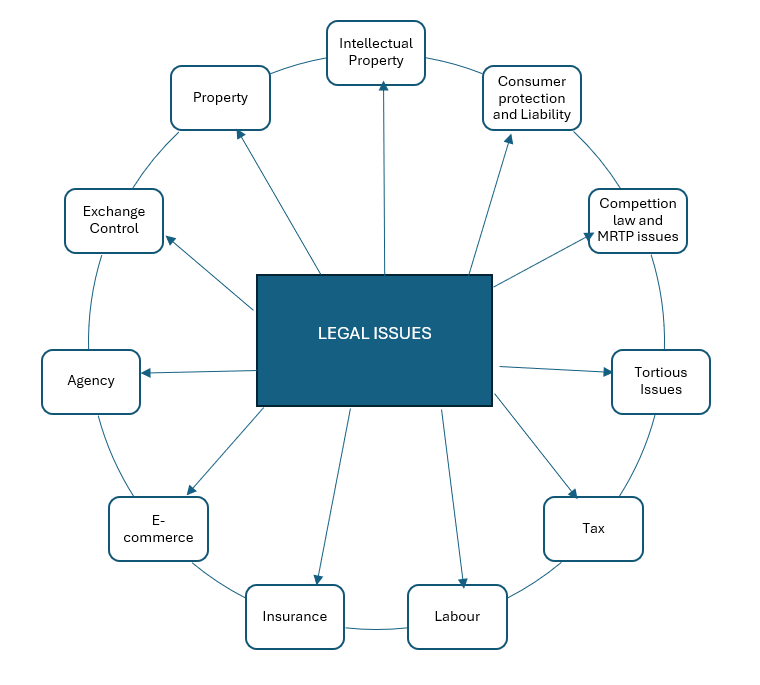Craving A Familiar Flavor? How Franchises Are Booming In India

Introduction:
Franchising has emerged as a prevalent phenomenon within the Indian market landscape, facilitating the dissemination of globally recognized brands to local communities. However, the success of this venture extends beyond the mere provision of popular products; it is underpinned by a nuanced framework of franchising laws and regulations. For both aspiring entrepreneurs seeking franchise opportunities and established brands aiming to expand their presence, navigating this intricate legal landscape is paramount to operational success.
At its core, franchising embodies a strategic business model wherein a franchisor grants a franchisee the privilege to operate under its esteemed brand identity and operational framework. This arrangement spans across various sectors, ranging from culinary delights at fast-food establishments to indulgent retail experiences. The proliferation of franchising in India is a testament to the nation’s burgeoning consumer demographic and its appetite for diverse offerings.
Table of Contents
Comparing Local And International Entry Strategy:
Foreign franchisors have several options when launching a franchise business in India. They can grant a single franchise to an individual, award master franchise rights to one entity, or sign franchise agreements for specific regions. Interestingly, setting up a separate entity in India isn’t mandatory for foreign franchisors. However, many of them prefer to establish a presence in India through a subsidiary or joint venture to have better control over the franchised business. For instance, Subway has formed a subsidiary in India to oversee all franchising operations, while McDonald’s entered India via joint ventures with two Indian entities.
Having an Indian subsidiary allows the franchisors to be more actively involved in the day-to-day management of the franchisees, ensuring brand consistency. However, joint venture arrangements can be less favorable due to the higher likelihood of disputes between the parties.
Regardless of the chosen entry strategy, franchisors must adhere to India’s Foreign Direct Investment Policy (FDI Policy)[1]. This policy dictates the types of entities that foreign nationals can establish, the percentage stake they can hold, and the necessary approvals and conditions. Additionally, all agreements must comply with the FDI policy, the Companies Act, 2013[2], and any prevailing foreign exchange control regulations. The franchisor’s subsidiary or joint venture entity must also comply with all applicable Indian laws, including those related to employment, labor, taxation, privacy, as well as any sector-specific regulations.
Local franchisors, on the other hand, typically employ direct franchising leveraging their local market knowledge to build a successful network and conduct due diligence on potential franchisees.
Legal Issues:
Understanding the potential impact of laws on these operations is important to anticipate any associated challenges:

The Legal Side of Owning a Franchise:
Unlike some countries like the United States, India doesn’t have a single law dedicated solely to franchising. Instead, it is governed by a combination of existing business laws and industry-specific regulations.
Statutory Provisions:
The Indian Contract Act[3] governs the legal relationship between franchisors and franchisees. The Consumer Protection Act[4] ensures fair treatment for customers who buy products or services from franchises.
Industry-Specific Regulations:
Different sectors may have specific regulations that impact franchising arrangements. For example, the food and beverage industry must comply with licensing requirements from local municipalities and adhere to food safety standards prescribed by regulatory authorities.
Contractual Agreements:
These agreements define the rights and obligations of each party, covering aspects such as intellectual property rights, territorial exclusivity, fee structures, and dispute resolution mechanisms.
CASE STUDY: MRF Tires- A Success Story
A noteworthy example in the Indian franchising is the expansion of MRF Tires, a leading automotive tire manufacturer. Through a strategic approach, MRF Tires has entered diverse markets across India, leveraging the brand’s reputation for quality and reliability. By empowering franchisees with comprehensive support and training programs, MRF Tires has created a strong distribution network, catering to the growing demand for automotive tires in both urban and rural areas.
FRANCHISING vs. LICENSING:
While franchising is often associated with brands and standardized experiences, it is sometimes confused with licensing agreements. Though there’s some overlap, these two models differ significantly:
| BASIS | LICENSING AGREEMENT | FRANCHISE AGREEMENT |
| Definition | Grants the rights to use its intellectual property or produce its products for a royalty. | Permits operating as an independent branch using the franchisor’s business model, brand name, or method for a fee. |
| Registration Requirement | Typically, not required. | Often required. |
| Control Over Business | Limited control over the licensee’s operations. | Significant control over various aspects. |
| Training and Assistance | Not included. | Includes extensive training and support. |
| Conditions of Use | Licensees are bound by the terms established by the licensor for the use of intellectual property or products specified in the licensing agreement. | Franchisees must adhere to specific operational guidelines and standards outlined by the franchisor in the franchise agreement. |
| Pricing Flexibility | Allows substantial negotiation. | Uniform pricing structures across all franchise locations. |
| Duration of Relationship | One-time transfer of property or rights, usually for a specified period. | Ongoing support and collaboration for the duration of the agreement. |
Way Ahead:
Projections suggest that India’s franchising sector will experience substantial growth, with expectations of reaching USD 140-150 billion within the next five years. Currently valued at around Rs 800 billion, the sector is expected to maintain a robust annual growth rate of 30% to 35%. India currently ranks as the second-largest franchise market in the world, with over 4,600 active franchisors and nearly 2 lakh outlets. Notably, the industry has created one million jobs and contributes close to 2% to the national GDP. Globally, this market is on an upward trajectory, with expectations of reaching USD 175.9 billion by 2030.[5]
Conclusion:
Since the economic liberalization of 1991, India has witnessed a surge in foreign corporations entering the marketplace through franchising, particularly in the hospitality and service sectors. Noteworthy international brands operating through franchises include Hertz, Avis, Budget for car rentals, and Radisson, Best Western, Quality Inns for hotels, among others.
Despite its immense potential in India, the absence of specific regulations for franchising poses significant challenges for both the parties. This was evident in the legal dispute between McDonald’s and one of its Indian joint venture partners, Vikram Bakshi. Implementing franchise-specific regulations could potentially address these issues, streamlining the process and encouraging further investment in the sector. Looking ahead, the potential for such regulations, coupled with the strategic use of technology in training, supply chain management, and customer engagement could be key differentiators for franchises in the years to come. As this sector continues to evolve, it has the potential to become a universal powerhouse, offering a win-win situation for both established brands and aspiring entrepreneurs.
[1] https://dpiit.gov.in/foreign-direct-investment/foreign-direct-investment-policy.
[2] https://www.mca.gov.in/Ministry/pdf/CompaniesAct2013.pdf.
[3] https://lddashboard.legislative.gov.in/sites/default/files/A1872-09.pdf.
[4] https://consumeraffairs.nic.in/acts-and-rules/consumer-protection.
[5] https://economictimes.indiatimes.com/
King Stubb & Kasiva,
Advocates & Attorneys
New Delhi | Mumbai | Bangalore | Chennai | Hyderabad | Mangalore | Pune | Kochi | Kolkata
Tel: +91 11 41032969 | Email: info@ksandk.com
By entering the email address you agree to our Privacy Policy.